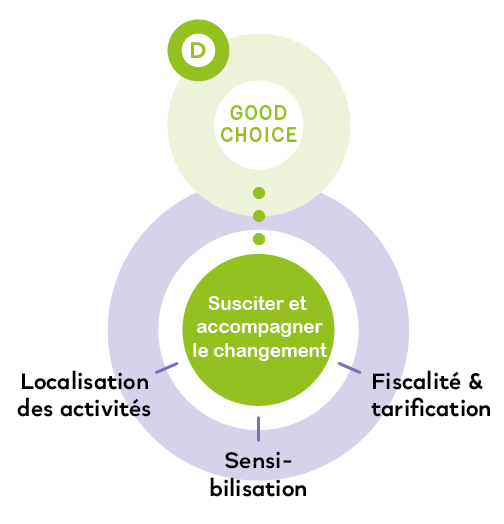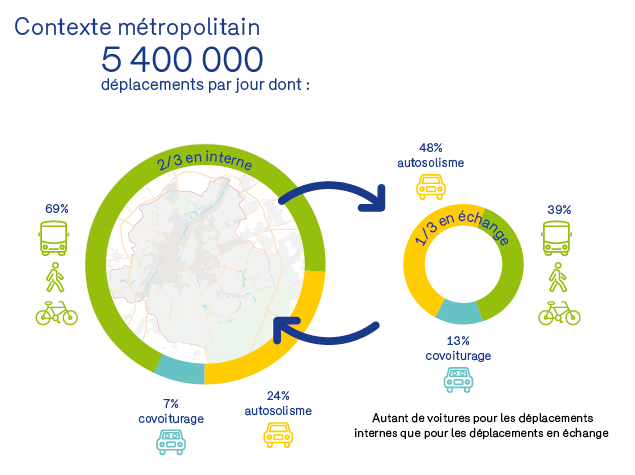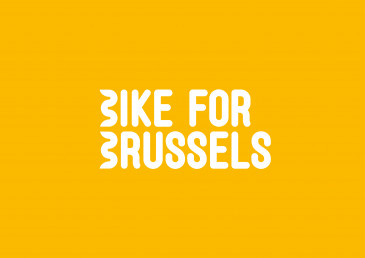
Good Move invites each user to be aware of his or her travel habits: choice of mode, time of travel, distance to be travelled, etc. with a view to encouraging citizens to reflect on and rationalise their mobility choices. Thus, the Region proposes to act in the following three directions:
- Link territorial development and the mobility options by establishing activities (services, equipment, jobs, tourist attractions and shops) at several centres of the capital, according to the principle of a dense city;
- Thoroughly examine the management of parking, pricing and (traffic) taxation in order to prioritise the different mobility solutions that improve the quality of life and health of citizens, as well as the environment;
- Raise awareness among adults and schoolchildren about the use of alternatives to a personal vehicle and proactively support businesses, schools and activity sites to rethink the movement of people and goods.

Plan de déplacements d'entreprise (PDE)
This plan consists of the study, implementation, evaluation and updating, within a company or group of companies, of measures designed to promote the sustainable travel management related to the activity of that company or companies.
Plan de déplacements scolaires (PDS)
This plan consists of the study, implementation and evaluation of measures to promote sustainable travel management within a school. It is therefore not only a question of improving safety conditions when travelling to and around the school embarking on the process, but also of making students more independent in their travel.
Plan de déplacements d’activité (PDA)
This plan consists of the study, implementation, evaluation and updating of measures designed to reduce the impact on mobility (traffic jams, parking problems, etc.) and local residents by a site operator or event organiser (cultural and sporting events, concerts, congresses, trade fairs, etc.).
Organisers and managers of sites hosting cultural, commercial and sports activities with more than 6,000 participants per day will be required to implement this plan. Certain measures will have to be taken, which will also apply to activities with between 1,000 and 6,000 participants per day.
However, implementing decrees have yet to be issued for this new law to come into force.
Brussels Environment will manage this obligation for site managers hosting activities with more than 6,000 paying participants per day and subject to environmental permits. Brussels Mobility will be the administration responsible for the other managers in question, as well as for activity organisers.
Plan de livraison d'entreprise (PLE)
The transport of goods in the city is very often only associated with the supply of shops. However, businesses and administrations of all sizes and business sectors also generate a significant number of goods movements. However, very few are aware of what goes in or out of their buildings, or how they operate and the budgetary impact of these movements.
Known in England as the Delivery & Servicing Plan, the DSP is a strategic document which, by optimising the delivery/pick-up process in an organisation or company, has several objectives:
- Guarantee deliveries and pick-ups under optimal conditions;
- Reduce costs related to order management and deliveries. These operating costs can effectively be reduced by grouping goods together to limit not only the number of movements, but also the time spent on receiving goods and purchasing activities;
- Reduce the negative impacts of deliveries, such as CO2 emissions, congestion and road safety failings.
In 2014, Brussels Mobility launched a call for applications for companies wishing to embark on a DSP. A major bank, a university and five SMEs, operating in fields as varied as hospitality, organic groceries and construction, were then given personalised support in drawing up their DSPs. These often led to practical measures being implemented, such as reducing the number of suppliers, using less polluting vehicles or using bicycle couriers.
In 2017, the Brussels Regional Public Service carried out the exercise for its own buildings, joining the European BuyZET project, which brought together the cities of Oslo, Copenhagen, Rotterdam, Southampton and Brussels and which aimed to define jointly how to change public procurement procedures in order to facilitate the emergence of sustainable urban logistics.
Diagnostis cards (French) :
-
The referenced media source is missing and needs to be re-embedded.
-
The referenced media source is missing and needs to be re-embedded.
Bike for Brussels

This Brussels Mobility initiative is designed to encourage all Brussels residents to work together for a more beautiful city. This platform brings together all the initiatives promoting cycling in our Capital city.
Bruxell'Air allowance
As a Brussels citizen, you can give up your car and travel around Brussels for free!
The Bruxell'Air allowance is a variable "mobility" package that you can obtain after you get rid of your car.
LEZ - Low Emission Zone
This is the term used to designate a zone where the most polluting vehicles are banned from driving. All cars, vans and (mini)buses are affected, whether they are registered in Belgium or abroad.
